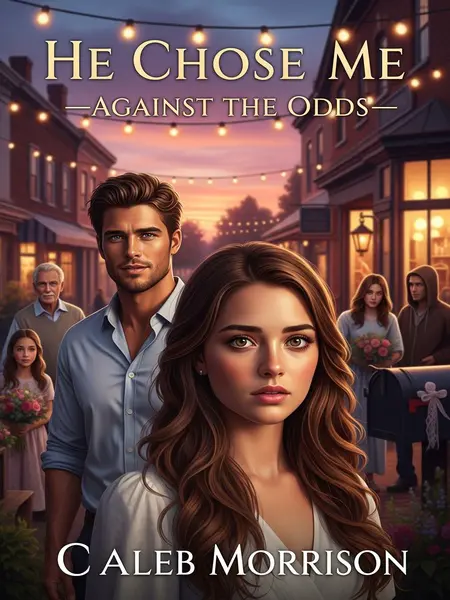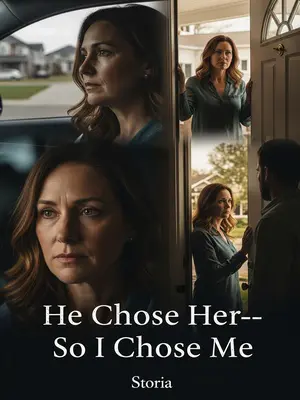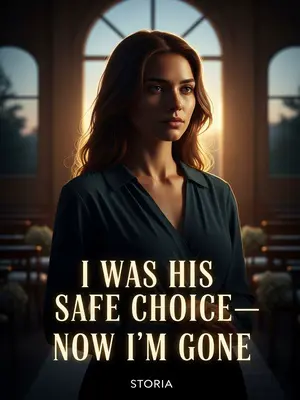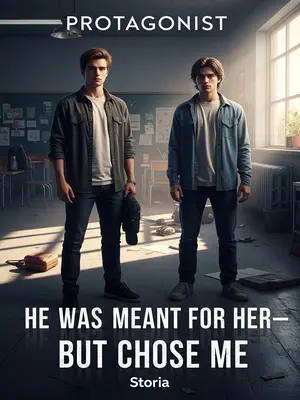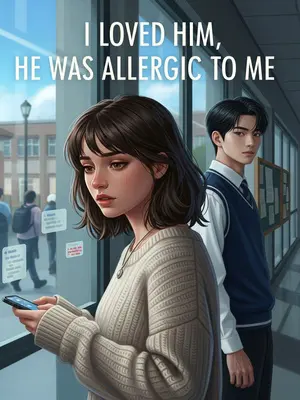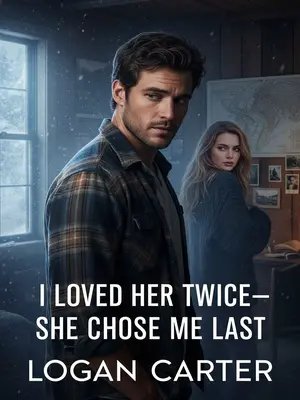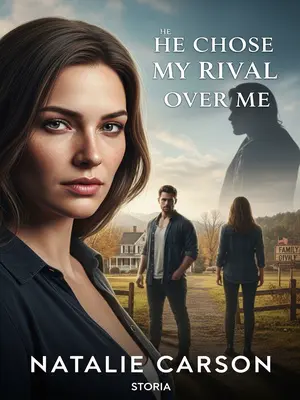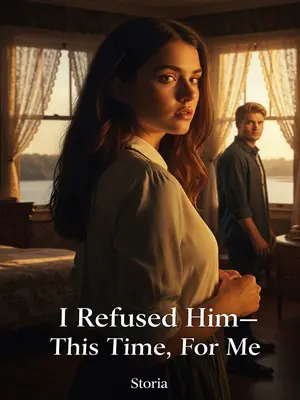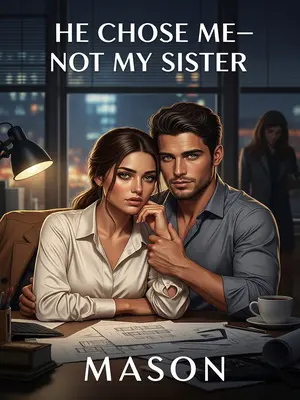Chapter 2: Family Warnings and Distant Dreams
When I got home, Mom was in the den doing embroidery.
The lamp flickered gently.
The room smelled of tea and starch, Mom’s hands moving in practiced, careful stitches. I watched her, suddenly aware of how small and ordinary our life was—and how much I loved it.
Our family wasn’t rich, but we didn’t need the women to support us. Mom often said that our meals came from the hard work our grandparents put in—every bite hard-won, every thread precious. We weren’t wealthy, so we had to remember our roots, appreciate our blessings, and live with gratitude.
She’d say it with a kind of pride, straightening her back and reminding me that being humble didn’t mean being small. I tried to remember that, especially on nights like this.
Mom looked up at me and said, “Out playing with Caleb again?”
Her voice was gentle but knowing, like she could see right through me. I tried to look innocent.
“We weren’t messing around, just looked at lights and came back.” I took off my jacket, changed into a lighter sweater, and picked up a needle and thread, watching Mom’s delicate stitches.
I let the thread slip through my fingers, pretending to be more interested in the pattern than in the conversation. My cheeks were still warm from the walk home.
I snipped the bright red thread, feeling oddly regretful. Mom said, “You should spend less time with Caleb from now on.”
She didn’t look up, but I heard the worry in her voice. I braced myself for the usual lecture.
“Okay,” I agreed.
I tried to sound casual, but something inside me twisted. I wasn’t surprised, but it still stung.
Nothing surprising there.
I’d heard it all before. Still, it felt different this time—like something final was settling in the air.
We weren’t really from the same world.
His dad was a college professor—maybe not the most famous, but still respected. His mom, even more impressive, was the daughter of a retired senator. The family wasn’t loaded, but they had a nice house, a couple cars, and a cleaning lady. Caleb was the youngest, talented, good-looking, and well-behaved. Years ago, a pastor said he was destined for greatness; when his cousin went for the spelling bee, Caleb was already onto the next academic competition. Lately, word was that even families from New York wanted to set their daughters up with him. If he nailed a top SAT score, who knew what kind of future awaited?
It was the kind of family you read about in the alumni magazine—old money, big expectations, never a hair out of place. Caleb fit right in, even when he tried not to.
And me? My family lived off my dad’s pension, lucky the world had been at peace lately. I knew nothing of music, chess, or painting—clumsy and silly—sometimes Caleb seemed more put-together than I was.
I was the girl who burned toast, tripped over her own feet, and had no clue which fork to use at a fancy dinner. Sometimes, I wondered if I’d ever really fit anywhere.
He’s up in the clouds; I’m stuck in the shallows.
I really don’t get why Caleb Morrison would be interested in me.
Mom put down her scissors, picked up a needle, and after a long pause, sighed, “It’s good you understand.” She rarely spoke to me this way—usually it was warnings or orders, never a tone that invited discussion.
Her voice was softer now, almost sad. I wondered if she was thinking about her own dreams, the ones she’d given up.
“Caleb’s a good boy, and he likes you, but let’s not talk about how fickle rich boys can be—just his mother would be hard enough to deal with. Our family may not be as well-off as theirs, but we don’t need to lower ourselves. If you want to blame someone, blame us for not being rich enough, for not giving you a better life to reach higher…”
Her words grew more and more disheartened.
She pressed her lips together, her eyes catching the lamplight. I hated seeing her like this—so strong, but so tired.
I might be careless, but I hated this kind of self-pity, so I interrupted, “Mom, you don’t have to say that. I understand—kids’ promises don’t count for much. Even if Caleb really does like me, I know I’m not lucky enough for it. People say love doesn’t pay the bills— even if the Morrison family is nice, I wouldn’t want to spend my life being looked down on. Caleb and I can only be childhood friends—no future, no forever.”
I’d thought about this for a long time.
I don’t remember when the idea started—maybe after Caleb got his first scholarship three years ago.
Back when our families lived across the street, and we were the only kids around. He didn’t have a tutor yet, so we played together every day—catching frogs, sharing cupcakes, talking about everything. We were worlds apart, but kids playing together didn’t matter to the adults.
He was always thoughtful, knew a lot, and thought even more.
Just handing him a bowl of chicken noodle soup would turn his ears bright red.
Just helping him patch a sleeve to cover up a fight, and he’d look away for half a day, too shy to meet my eyes.
Just walking with Mr. Sanders’s only daughter, and I’d gossip with others about how they were a perfect match—he’d come argue with me for ages, cheeks puffed out.
I thought we’d always be like that—grow up, start our own lives, and always feel close, even if far apart. But when I told him that, he clearly didn’t agree—he insisted the world was full of schemers, that it was better to seize the moment and stay close to home…
I always pretended not to understand, so as not to hurt his pride.
As we got older, he grew more reserved. He stopped saying those strange things. Sometimes I thought, maybe it’d be nice if things stayed that way—someone to play with, to keep me company.
But life changes. He kept getting better.
I couldn’t keep up.
As much as I hated to admit it.
Kids make the most careless promises, never thinking how things change with time.
Even if we kept those childhood promises, how long could they last? If I ended up as just an extra in his life, watching the boy I knew become a distant, cold man—no, I’d rather not.
I never quite trusted childish vows.
Mom seemed startled by my words. After a long time, she finally put the needle to the fabric, her mood unreadable.
She looked at me like she was seeing me for the first time. I wondered if she was proud, or just sad.
Spring’s chill hadn’t fully faded. The wind still blew, but I realized it had changed direction.
Somewhere, a wind chime tinkled. The world felt on the edge of something new, and I wrapped my arms around myself, unsure if I was ready.
Grass was growing, robins flying—it was supposed to be a lively spring, but here, it still felt lonely.
The grasshopper figurine on my desk was no match for my lantern, but it was novel enough.
I’d found it at a yard sale, chipped but charming. It kept me company on nights when I couldn’t sleep.
But I did feel sorry for the neighbor kid who’d waited at my door since dawn on the sixteenth.
Counting the days, Caleb had been gone over two weeks.
The house felt emptier without him—his laughter, his endless questions, even his annoying humming. I missed it all, more than I wanted to admit.
Thinking of the spicy food in New Orleans, and how Caleb couldn’t handle spice, made me want to laugh.
He never could eat spicy food—just a little and he’d break out in a rash, drinking water and broth all day.
I remembered the time he tried a single bite of jambalaya at the county fair and spent the rest of the night gulping lemonade. He’d glared at me like it was my fault.
His dad worried so much, he sent several friends along, but most were sent back after ten miles. His mom complained every day, wishing she could fly there herself.
She called every night, voice tight with worry, asking if he’d eaten, if he’d made any friends, if he was getting enough sleep. I almost felt sorry for him.
I snipped a thread from my embroidery hoop, the snap startling me. Oh no, I’d cut it before finishing! Was I losing my mind again?
Afraid of a scolding, I tossed the ruined piece aside and snuck out an old one to cover up.
Well, it wasn’t the first time. As long as I was happy and Mom was happy, what’s the harm?
I grinned at my own sneakiness, relieved I’d gotten away with it again. Maybe one day I’d actually finish something right.
“—Autumn!”
Guilty, I bumped into the hoop, trying to cover up. “I was just borrowing…”
I tried to look innocent, but my cheeks betrayed me, flushing pink.
“Hey, who said anything about that?” The old housekeeper laughed. “Come out, Mrs. Parker from the pharmacy is here to see you!”
I groaned. Mrs. Parker was the town’s resident busybody, and I wasn’t in the mood for her matchmaking today.
“What’s there to see? I’m not going.”
I tried to hide behind the door, but the housekeeper was having none of it.
Mrs. Parker was the worst—she’d pester you with endless questions, dig up your family history, and gossip about everyone. She’d see a mole on your face and talk about your ancestors’ scandals, then segue into tales of Southern belles—because, you know, every girl wants to be a debutante.
When we were kids, she’d shout on the street that Caleb was girlish, telling his family to watch him. That nickname stuck, and Caleb still grinds his teeth over it.
Later, when his sister Zoe went to buy licorice, Mrs. Parker said she had “childbearing hips and a doomed fate.” Zoe, not yet engaged, was so embarrassed she ran home in tears.
As much as I hated Mrs. Parker, I couldn’t win against the housekeeper, who dragged me out by the ear.
She had a grip like a vice, and I knew better than to fight it. I straightened my sweater and prepared for battle.
“Today I’m here to talk about setting you up,” Mrs. Parker beamed, showing her half-toothless grin.
She patted my arm, leaning in like she was about to share a secret. I held my breath, bracing myself.
Mom smiled politely. “You’re too quick, Linda. Autumn’s still shy.”
She poured tea with a steady hand, but I could see the tension in her shoulders.
“It’s only natural, nothing to be shy about,” she said. “Look at my nephew, working at our pharmacy—he’s sharp in every way…”
Mrs. Parker launched into a list of his virtues, from his handwriting to his work ethic. I tuned her out, watching the steam curl from my mug.
I yawned, letting her and Mom go on.
Caleb would never guess—it was that shopkeeper, Parker!
That guy who loved quoting classics and lecturing Caleb whenever he tried to sneak off. Caleb hated him, always dodging when he heard his voice.
I used to joke that Caleb was a bookworm, good for nothing but studying, but at least he’d sneak off to catch frogs with me, or make grasshopper traps. Shopkeeper Parker just scolded us for wasting time and reminded Caleb how soon the SAT was coming.
Who’d have thought I’d end up stuck behind the counter, counting pickled eggs, for the rest of my life?
I sighed.
I slumped in my chair, letting my hair fall over my face. If only I could disappear into the wallpaper.
“Autumn, you’ve met him, right?” she asked.
“Ah? Oh, yes.” I had no idea what she was talking about.
I nodded, hoping that would be enough. Mrs. Parker’s eyes sparkled, and I realized I’d just made things worse.
Mrs. Parker was delighted. “See? Autumn says so too. My nephew’s handwriting is beautiful, he’s well-read, and diligent—sure to be a pharmacist one day.”
She beamed at Mom, who gave me a warning look. I tried to shrink into my chair.
Mom smiled awkwardly, probably realizing I was zoning out, and shot me a sharp look. “You’re right, Linda. But for us, the most important thing is that he treats Autumn well, has good character, looks decent, and comes from a respectable family.”
Her words were careful, but I could tell she was trying to stall.
“Then let’s swap birth dates and have someone check compatibility (old family superstition)—let’s settle this soon!” Mrs. Parker was always in a rush.
She leaned forward, eager as ever. I wished I could disappear.
“Well…” Mom hesitated. “It’s a bit early—Autumn’s still a bit scattered.”
Mom never liked pushy types, so she wouldn’t agree easily. Mrs. Parker, sensing Mom was harder to sway than me, pressed on: “Autumn, think carefully—miss this chance and it’s gone! My nephew’s going to be a pharmacist, and you’ll be a proper professional’s wife!”
I pouted, “If he can marry, he can also divorce.”
I couldn’t help myself—the words slipped out before I could stop them.
Mom choked on her tea.
She coughed, shooting me a look that said, ‘Not now!’ I tried to look innocent.
Mrs. Parker was shocked.
Her mouth fell open, and for once, she was speechless. I almost smiled.
“Hey! What kind of talk is that? We watched you kids grow up—how could our family do something so disgraceful?”
She huffed, crossing her arms. I resisted the urge to roll my eyes.
Mostly, it was Caleb’s grudge—
Shopkeeper Parker used to have a clever little white dog, but when he saw Caleb’s hunting dog was more impressive, he dumped his for a new one. Caleb thought he was fickle, and though he didn’t gossip, he couldn’t help but dislike him. Still, he took in the abandoned dog, who ended up fighting stray dogs for scraps. Caleb, who loved dogs, took care of it. He didn’t like Shopkeeper Parker, but he couldn’t bear to see the dog suffer.
I always thought that said more about Caleb than anyone else—he couldn’t turn his back on anyone, not even a stray.
“My nephew’s going to be a pharmacist—he’s a man of principle…” There it was again! What was their obsession with professionals? The match wasn’t even set yet!
I rolled my eyes so hard it hurt. Since when did being a pharmacist make you some kind of saint?
“What’s so great about being a pharmacist? Didn’t Caleb Morrison get his first scholarship at fifteen?” I blurted out, meaning to warn her not to pin her hopes on future glory. But Mrs. Parker just laughed, as if I’d said something outrageous. “Autumn, you’ve got quite the attitude!”
She wagged her finger at me, but I could see the irritation in her eyes.
She wiped her mouth and said, “Caleb Morrison’s family is out of reach for ordinary folks like us. Sure, you two get along, but the match isn’t set! His family has pedigree—just look at their standards! His mom is the daughter of a senator, and dotes on her son! And Caleb—handsome, talented, raised under the watchful eyes of his whole family—he doesn’t even look at the local beauties. Do you really think someone like that would pick you? He’s destined for greatness—why would he settle? If you keep aiming so high, you’ll never get married!”
My fingers went cold, my cheeks flushed.
Her words stung, sharp as a slap. I looked down, tracing the wood grain on the table.
Mom’s face didn’t look good either.
She pressed her lips together, eyes narrowed. I could tell she wanted to defend me, but wasn’t sure how.
It was like an ugly scar, suddenly exposed to the light.
All the things we tried not to talk about—money, status, family—laid bare for everyone to see.
“…Linda, that’s enough,” Mom said. “They’re just kids—why be so harsh?”
Her voice was tight, barely hiding her anger.
Mrs. Parker sneered, “You say that now, but if Caleb marries a big-city girl, the gossip will start.”
She shook her head, as if she knew better than all of us. I wanted to scream.
“Mrs. Parker.” I had to say something—otherwise, how could I face the neighbors tomorrow?
I took a shaky breath, determined not to let her words define me.
“I think you misunderstood me.” My voice trembled, barely steady.
I forced myself to meet her gaze, even as my heart pounded in my chest.
“I never aimed to marry into wealth. There are countless men in the world—I’ve never thought of tying myself to just one! But just because I’m ordinary, does that mean I deserve a mediocre, messy match?”
I could hear the quiver in my words, but I pressed on. I wasn’t going to let her shame me into silence.
“Pah!” Mrs. Parker spat. “Who are you calling filthy? Insulting my family?”
She stood up, hands on hips, ready for a fight.
“—Linda! Autumn speaks without thinking, she didn’t mean to offend you…”
Mom tried to smooth things over, but the damage was done.
But I couldn’t hear anything anymore. Let them argue.
My ears rang, the world narrowing to a dull roar. I stared at my hands, willing myself not to cry.
I’d been too impulsive—when had I ever been so bold?
Maybe I’d finally reached my limit. Maybe I was just tired of being told what I deserved.
But in all my years, when had I been so humiliated?
I bit the inside of my cheek, trying to swallow the lump in my throat.
It wasn’t my fault to be born lower on the ladder, but I’d always behaved myself—why should fate keep tripping me up?
I wanted to scream at the unfairness of it all, but all I could do was sit there, small and silent.
So what if I aimed high, or fell short?
Was I supposed to crawl through life, thinking I was less than others?
Why did fate have to be so cruel?
To come and go as I pleased, to live as I liked—that’s something most people never achieve.
I thought of all the women I’d known—mothers, daughters, friends—each one carrying her own burdens, each one dreaming of something more.
In truth, what hurt most wasn’t Mrs. Parker’s harsh words, but how accurately she’d struck a nerve.
She’d named every fear I’d ever had, every secret doubt I tried to hide. It was like she’d reached inside me and pulled them out for everyone to see.
I knew our differences, so I kept my distance; I cared about matching families, so I felt inferior and jealous; I followed the rules, but couldn’t let go of longing, stuck between two paths.
Always walking a tightrope, never knowing which way I’d tip.
Why be so clear-eyed?
If I just went with the flow, maybe I wouldn’t feel so small and powerless;
If I could stand apart from the world, maybe I could treat life as a dream, ignoring gain and loss.
But I couldn’t. I wanted too much, and not enough.
I don’t remember how Mrs. Parker left, or what Mom looked like. Was she angry? Was she sad?
All I knew was—to hell with greed and anger!
I wiped my eyes, straightened my back, and promised myself I wouldn’t let anyone make me feel small again.
At worst, I’d just live as a free spirit.
